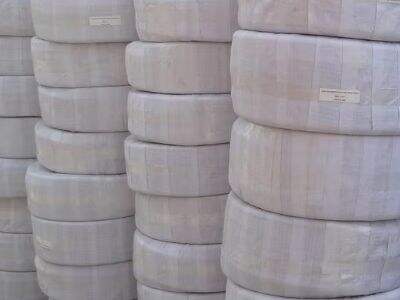A növény vízigényének megértése:
Az első lépés a megfelelő sík öntözőcső kiválasztásához annak tudása, hogy mennyi vízre van szüksége a növényeinek. Minden növénynek más a vízigénye, ezért jó tudni, hogy mennyi vízre van szüksége az adott növényeinek a megfelelő növekedéshez. Egyes növényeknek több vízre van szükségük, mint másoknak, ezért az öntözőcső kiválasztásakor ezt is figyelembe kell venni.
Sík öntözőcső anyagainak összehasonlítása:
A sík öntözőcsövek különféle anyagokból készülnek, mindegyiknek megvannak az előnyei és hátrányai. A PVC, polietilén, gumi néhány szabványos anyag. A PVC csövek erősek és nem rozsdásodnak, sima belsejűek, kémiai ellenállók és nagy átfolyási jellemzőkkel rendelkeznek, a polietilén csövek (HDPE) erősek, rugalmasak és könnyen kezelhetők, valamint rendkívül egyszerűen összeszerelhetők. A gumicsövek könnyen kezelhetők és praktikusak, így kisebb gazdaságokban jó választást jelentenek. Gondolja át minden anyagtípus előnyeit és hátrányait, mielőtt döntene.
A vízáramlás sebességének és nyomásigényének meghatározása:
A vízáramlási sebességek és a nyomásviszonyok kiválasztása is nagyon fontos a lapos öntözőcső kiválasztásakor. A különböző csövek eltérő áramlási sebességgel és nyomástartó képességgel rendelkeznek, ezért fontos a cső igényeinek megfelelő kiválasztása. Ha nagy farmja van sok növénnyel, akkor nagyobb áramlási sebessiségű és nyomástartó képességű csőre lehet szüksége. Egy kisebb farm és kevesebb növény esetén az áramlási sebesség és a nyomástartó képesség alacsonyabb is lehet.
A cső hosszának és átmérőjének figyelembevétele:
Másodszor fontos, hogy megértsük a lapos öntözőcső hosszát és átmérőjét. A cső hosszát Ön dönti el, figyelembe véve a farm méretét és a növények szerkezetét. Nagyobb farmokhoz hosszabb cső használata lehet szükséges, míg kisebb farmokhoz elegendő egy rövidebb is. A cső mérete közvetlenül befolyásolja az áramlási sebességet és a nyomástartó képességet is, ezért ügyeljünk arra, hogy a megfelelő méretet válasszuk ki.
Hosszú távú fenntarthatósági és karbantartási szempontok:
Végül ne feledkezz meg arról sem, hogy mennyi ideig tart a sík öntözőcső élettartama és a karbantartási költségek. Tartsd szem előtt, hogy egyes anyagok karbantartásigényesebbek másoknál, így ezt is figyelembe kell venni a döntésnél. Gondolj arra is, mennyibe kerül majd a cső jövőbeli cseréje és a karbantartási díjak. Válassz olyan csövet, ami tartós, és nem fogja megrontani a pénztárcádat.
Összefoglalva, a megfelelő sík öntözőcső kiválasztása a növényeinek kritikus fontosságú ahhoz, hogy biztosítsa a megfelelő mennyiségű vizet az egészséges és erős növekedéshez. Ha ismeri a növények vízigényét, összehasonlítja a különböző csőanyagokat, kiszámítja a térfogatáramot és a nyomásesést, figyelembe veszi a cső hosszát és átmérőjét, valamint tájékozódik a jövőbeli karbantartási és cserélési költségekről, akkor tudatos és megfontolt döntést hozhat, amely évekig hasznosulhat a farmján. Bízhat benne, hogy az Eastop a Ön által megérdemelt sík öntözőcsövet szolgáltatja, biztosítva a növények erősségét és egészségét.

 EN
EN
 AR
AR
 BG
BG
 HR
HR
 CS
CS
 DA
DA
 NL
NL
 FR
FR
 DE
DE
 IT
IT
 PT
PT
 RO
RO
 RU
RU
 ES
ES
 TL
TL
 ID
ID
 VI
VI
 HU
HU
 TH
TH
 MS
MS
 BN
BN

